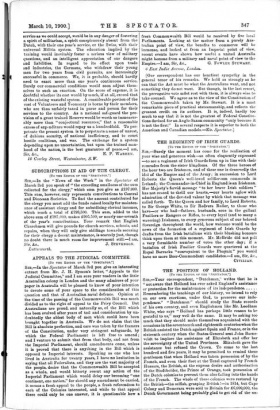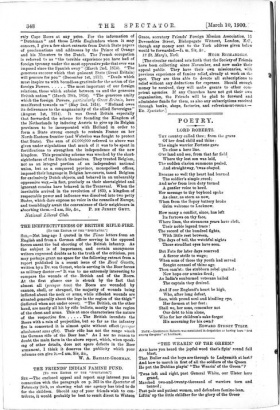THE POSITION OF HOLLAND.
(To THE EDITOR OP THE 'SPECTATOR."] SIE,—Your correspondent, "Dutchman," writes that he is "not aware that Holland has ever asked England's assistance or protection for the maintenance of its independence Remembering the teachings of our history, we intend to rely on our own exertions, under God, to preserve our inde- pendence." "Dutchman" should study the State records of his own country, and even Englishmen like Mr. Leedham White, who says "Holland has perhaps little reason to be grateful to us," may well do the same. It may be asking too much that they should make themselves acquainted with the occasions in the seventeenth and eighteenth centuries when the British assisted the Dutch against Spain and France, or in the sixteenth century when the States-General sent John Berne- veldt to implore the assistance of Elizabeth and offer her the sovereignty of the United Provinces. Elizabeth gave the assistance but refined the Crown. To come to the last hundred and five years, it may be permitted to remind these gentlemen that when Holland was taken possession of by the French, and even their fleet at the Texel captured by French Hussars, the British, at the express desire and authorisation of the Stadtholder, the Prince of Orange, took possession of the Dutch colonies to prevent them also falling into the bands of the French. The whole of these colonies were restored by the British—the selfish, grasping British !—in 1814, but Cape Colony and Demerara were sold to Britain for 26,000,000, the Dutch Government being probably glad to get rid of the un-
rnly Cape Boers at any price. For the information of "Dutchman" and those Little Englanders whom it may concern, I give a few short extracts from Dutch State papers of proclamations and addresses by the Prince of Orange and his Ministers to the Dutch. The French occupation is referred to as "the terrible experience you have had of foreign tyranny under the most oppressive yoke that ever was imposed since the Spanish sway" (March 2nd, 1814). "The generous succour which that puissant State (Great Britain) will procure for you" (December 1st, 1813). "Deeds which must inspire us with boundless gratitude for the action of the
foreign Powers The most important of our foreign relations, those which subsist between us and the generous British nation" (March 30th, 1814), "The generous amity which the foreign Powers, part;cularly Great BrZtain, have manifested towards us" (May 2nd, 1814). "Holland owes its deliverance to the magnanimity of the allied Sovereigns" (August 1st, 1814). It was Great Britain especially that forwarded the scheme for founding the Kingdom of the Netherlands by inducing Austria to give up its Belgian provinces to be incorporated with Holland in order to form a State strong enough to restrain France on her North-Eastern frontier (and Waterloo was fought to protect that State). The sum of A3,000,000 referred to above was given under stipulations that much of it was to be spent in fortifications to strengthen the independence of the new kingdom. This promising scheme was wrecked by the short- sightedness of the Dutch themselves. They treated Belgium, not as an integral portion of an independent national union, but as a conquered province, monopolised offices, imposed their language in Belgian law-courts, taxed Belgium for exclusively Dutch objects, and behaved in an unbearably oppressive way,—in fact, precisely as their shortsighted and ignorant cousins have behaved in the Transvaal. When the inevitable arrived in the revolution of 1830, a kingdom of respectable power and influence was dissolved into two petty States, which dare express no voice in the councils of Europe, and tremblingly await the convenience of their neighbours in absorbing them.—I am, Sir, &c., P. DE JERSEY GRUT, National Liberal Club.







































 Previous page
Previous page